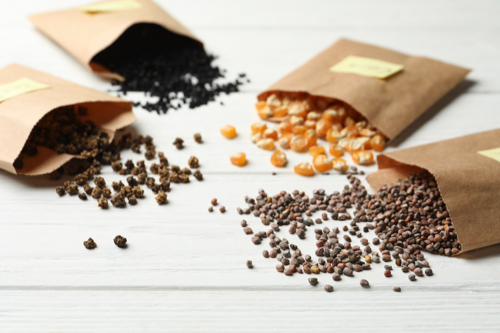What Are Heirloom Seeds?

If you’ve browsed a seed catalog, chances are you’ve come across the term “heirloom,” or maybe you’ve heard the buzz about these seeds in the gardening world. Either way, you’re here to find out what they are and what makes them so special — so let’s dive in. Heirloom seeds have so much going for them!
First off, in order to qualify as an heirloom seed, the seed must have been handed down from one generation to the next. The generally accepted rule is that a seed must be about 50 to 70 years old to be considered “heirloom” and the variety has to have been documented before man was cross-pollinating or hybridizing plants on their own (artificial selection), making heirloom seeds “open-pollinated.” With many heirloom seeds being grown before World War II, there are inevitably going to be some incredibly fascinating stories out there to accompany these prized seeds. Some can even be traced back to seeds that came over with the pilgrims!
Why Heirloom Seeds Are Worth Saving
Whether they be heirloom tomato seeds or heirloom flower seeds, what about the seeds make them worth saving from one generation to the next? Well, for starters, it is usually a special trait or quality that makes them so, like how a seed grows in its specific region, or its size, and more often than not, unique flavors are the motivation. Heirloom fruit and vegetables always seem to taste the best, and it’s a taste you can rely on and come to expect as they come true to seed year after year. That means you can save the seed and it's going to produce an identical flower or fruit in the next generation to come (that is not the case for modern hybrid vegetables and flowers) due to open-pollination. More about that in a moment.
What we enjoy about heirloom harvests today are the same qualities our parents — and their parents before them — enjoyed. What is not to like about growing vegetables from your great-grandparents’ seeds? Nostalgic and practical sums it right up.
What on Earth Is Open-Pollinated?
Open-pollination refers both to the way pollination occurs and to the true breeding ability of the plant. Heirloom garden seeds are open-pollinated, meaning they naturally pollinate in nature (by birds, bats, insects, wind, rain) and do not require any intervention from man to be pollinated. These naturally occurring seeds produce true to their original parent plant, year after year. It’s important to note that not all open-pollinated seeds are heirloom, but all heirloom seeds (seeds that are at least 50 years old or older) are open-pollinated.
Note that if you are growing more than one variety in the same area, cross-pollination can occur, so you may end up with some hybrid plants the following year. This can be remedied by staggering your planting so that the same species are pollinating at different times, or separate plants of the same species to different areas of the garden. Self-pollinating fruits and vegetables can also be isolated with a mesh or paper bag over the blossoms until the fruiting is visible.
Why You Should Try Heirloom Gardening
The most obvious reason to try heirloom gardening is that once you start your heirloom garden, you can collect the seeds from your strongest plants and save them for the next year, making the following year’s crop even stronger and eliminating the need to repurchase seeds seasonally. If the seeds are properly stored, they might even be usable for more than a year, depending on the type of seed. There are many heirloom varieties to choose from, including:
In addition, your plants will continue to adapt to your particular environment and will produce quality plants specific to your microclimate year to year. Lastly, coming from hundreds of years of selection and proper care, heirloom vegetables are typically more genetically diverse and flavorful due to there being no restrictions on the flow of pollen between plants. All of the above continues to get better with age!
Maintaining These Treasured Heirloom Varieties
Heirloom seeds are undoubtedly a treasure and a gift from the past. There are families who have seeds that originated from great-grandparents’ gardens dating back to the 1800s, and they still produce the same veggies year after year. How incredible is that? These seeds end up giving us not only plants with beautifully unique colors, flavors, and textures, but they are also a reminder of a time when our ancestors were working and connecting with the soil to feed their families. Preservation of these incredible characteristics is not something you will find in a big-box store. Maintaining these treasured heirloom varieties by saving their seeds is the only way to ensure those traits we’ve grown to love breed true for generations to come.
|
|
|